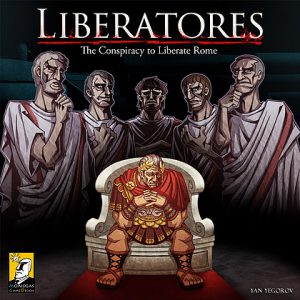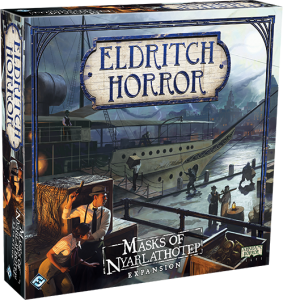Alderac / Artipia Games
The prophecy in The Masters’ Trials foretells the coming of four great champions, masters of the four elemental orders, that would come forward in times of great peril to save the world. The prophecy is a bit vague about how they are going to do that. And who are those great masters, anyway? Some clarity on the subject comes from Alderac’s previews. The masters are put together each game with three choices their player makes. Each master has a Class, an Order and a magic Weapon. For each choice they get the matching deck of cards, each with their own strengths and weaknesses. Each combination will have its own synergies between the three decks, so you can have a different experience every time you play. That’ll keep us busy for a bit already, and for later I can’t help noticing how very expandable the concept is…
FryxGames
There are basically two ways to resolve a conflict, and this new preview post by FryxGames shows them both. First, we see new cards for Terraforming Mars: Venus Next. The Omnicourt is the court that settles issues transcending national and even planetary boundaries. Corporations that span planets need a new way to solve their judiciary disputes, and the Omnicourt is it.
The other way to resolve a conflict is, of course, violence. But let’s be honest here, when your opponents cross the border between life and death they’re not going to accept any court’s authority. The best way to deal with zombies was, is and will always be the shotgun, and Ruth is the right person to wield it in After the Virus.
Moiadeas Game Design

Yan Yegorov, designer of Liberatores: The Conspiracy to Liberate Rom, has written a very interesting designer diary on BoardGameGeek. It’s a great read because it explains what Liberatores does different from other games with a traitor. Yan didn’t want to hide the traitor through hidden information like other games do, so he came up with two ideas. First, there is not one traitor but two, with different goals. While the regular players want to assassinate Caesar, one player is his agent and wants to save him. Another player is technically on the assassins’ side, but if he manages to have more personal power than the others when they kill Caesar he becomes the new emperor and wins the game alone. The second idea is that all actions are ambigouos. So an action might give Caesar more power, which is great if you’re playing as his agent, but the same action is also the way to gain money. Everyone will want that action, so everything can happen out in the open. I’m very curious how this new sort of game with traitor will work out. If you are as well, you can still pre-order Liberatores from Moaideas Game Design to pick up at the Essen fair.
White Goblin Games
In White Goblin Games’s latest newsletter they present four new releases they’re bringing to Essen. Let’s start with what looks like the simplest one. Claim is a two player, two phase trick taking game. In the first phase the players play thirteen tricks. The winner doesn’t take the cards in the trick but a card that was revealed from the remaining cards. The loser takes a random card, so sometimes losing a trick might be the better deal. After the thirteen tricks both players take the cards they won into their hand and play thirteen more tricks with them, but now the winner scores the cards. In phase one you try to build the best hand to score points with in phase two. But planning that won’t be quite so simple because the five suits have special abilities. It’s a really interesting idea to do trick taking in two phases. The only problem for us will be that two player games rarely see the table.
Next we have Montana, a rare example for a lighter worker placement game that should play in 45 minutes or less. While building the first towns in Montana players have many opportunities for profit. Mining for copper, quarrying, growing pumpkins or grain, all those things are needed. But each needs specialised workers, and the two workers you take per turn are random – unless you pay to choose them, at least. For all four resources you simply place workers to take resources, that’s really all there is. There is one only more complex action in the City, where players bid for different bonuses. With the resources you gather you pay for new settlements on the board. That’s the real goal of Montana, because the player with the most settlements wins.
Release number three is quickly explained, Bali is a remake of Klaus-Jürgen Wrede’s card game Rapa Nui. Players compete once more to have the most valuable card at the end, and they determine the values through sacrifices at the shrines they build. It’s a fun game with a clever scoring mechanism, just like Rapa Nui only on a different islands. There is a difference in the game, and that’s the inclusion of two expansion modules, The Oracle and The Demon, both with small but interesting changes to the base game.
And finally there’s Ali Baba, a family game to collect treasures. Each treasure tile has a type and a color. The type is important for your score, larger sets are worth more. The color gives you a helpful magic effect. Use those well to have a chance to win. The treasure tiles are arranged in a pyramid, when you take one you reveal the ones below and open new opportunities for your opponent. Ali Baba is light, but sounds like a fun game to play with kids.
Everything Epic
Sometimes I’m glad when first impressions turn out to be wrong. When I saw the Kickstarter for Coma Ward: The Horror Board Game and it’s warning that it’s for mature audiences only I expected a horror dungeon crawler. (I have nothing against those, but there are so many dungeon crawlers.) Fortunately, it turns out that Coma Ward is not that. It’s a game about terror and exploration. In phase one up to six players wake up in an otherwise abandoned hospital with no memories of their former lives. They’ll explore the hospital and look helpful tools until and clues what the hell is going on. When they found three clues, they discover what is heppening, called the Phenomenon. Which Phenomenon they find depends on the clues they discovered, and each Phenomenon has its own victory conditions and special rules. Some are cooperative, some less so. All that sounds familiar, of course, because it follows the same basic outline as Betrayal at House on the Hill, but it replaces the cheesy haunted house monster horror setting with the more modern and often more scary haunted hospital. That’s a concept I can get behind.
Fantasy Flight Games

A special treat for Lovecraft lovers: while Chaosium publishes a new edition of the classic Call of Cthulhu adventure Masks of Nyarlathotep Fantasy Flight Games will bring the same adventure to Eldritch Horror with the next expansion, also titled Masks of Nyarlathotep. Besides the obvious, Nyarlathotep as a new Old One to go up against, this expansion brings some more things. All investigators get a personal backstory that holds a reward if it’s reolved, but also dire consequences if it isn’t. But the toughest addition is going to be the campaign mode. You just about survived the fight against one Great Old One, and then you go to the next game with all the boons and problems you acquired to fight of the next. Let’s see for how long you can keep going.

